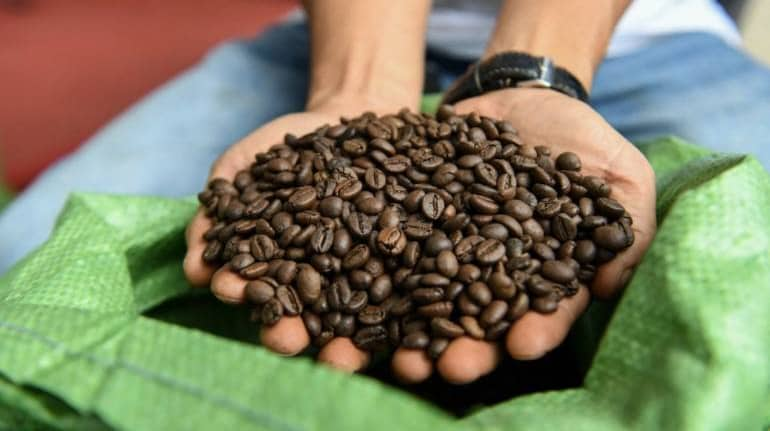



India’s coffee industry is going in for increased chicory blends to keep prices in check as bean costs climb steadily.
Chicory, a cheaper coffee substitute without caffeine, is added to coffee to enhance the aroma and taste. The ratio of chicory usage in coffee has gone up to almost 50 percent from 20-30 percent as prices of the latter have risen on concerns over dry weather in Brazil and an output shortfall in Vietnam, the two largest coffee producers.
January robusta coffee futures are at an almost six-month high at $2,850 per tonne. Arabica December futures have jumped to over $2.01 per pound.
Indian robusta, used more in instant and filter coffee, sells in the range of Rs 260-270 per kg. The arabica variety sells at Rs 300 per kg. Local coffee brewers find it hard to absorb the price increase.
“Pure coffee retails around Rs 740 per kg while with chicory the cost drops to Rs 560 per kg, which is still on the higher side. This has already affected consumption as many people drinking 5-6 cups of coffee a day have cut it down to half,’’ said Shankar Krishnan, a partner of Kannan Jubilee Coffee.
The premium variants of pure coffee cost over Rs 3,000 per kg.
Controlling prices
“Even for our medium variant of instant coffee, it is about Rs 2,000 per kg with around 30 percent blend of chicory,’’ said N Sathappan, director of SLN Coffee.
With the surge in coffee prices, producers are increasingly using almost 50 percent chicory to control retail prices, he added. As a hike in coffee prices could have an adverse effect on consumption, producers prefer to use such methods to control prices and minimise losses.
Chicory prices, too, have gone up in India on higher demand and a crop shortfall this year. Primarily grown in Gujarat and Uttar Pradesh, more than 50 percent of India’s chicory production is exported.
Chicory demand has risen in overseas markets also with coffee prices going up. Chicory producers are finding more buyers in Europe, Russia and Africa.
The powdered form of the chicory plant root is usually used in coffee blends. It is also available in roasted and liquid forms.
“The prices of dried chicory have increased from Rs 60-70 per kg to Rs 80-100 per kg now. We have not seen such price levels so far,’’ said Nitin Keshwala, a partner at PMK Chicory. Production fell short this year with climate change damaging the crop in Uttar Pradesh. But high prices boosted the sowing of chicory for next year’s harvest, which gets underway by February.
“There has been a 20 percent rise in sowing. Normally, dried chicory production is around 70,000 tonnes. But this time we expect it to rise to 1-1.10 lakh tonnes,’’ Keshwala said. It takes 4 kg of green chicory to produce one kg of dried form.
Usually, at the time of sowing, crops such as potatoes and millets are preferred over chicory as they fetch better earnings. But this year, encouraged by high prices, more farmers sowed chicory in Gujarat and Uttar Pradesh. India has become a key supplier of chicory as the local variety is cheaper and more sustainable.
“Though it is grown in European countries and South Africa, the cost is higher. In Europe, because of the cold weather, they need higher energy to dry chicory, Besides, labour is also not cheap. In Africa, it is done mostly on a cooperative basis. They have a high minimum selling price and besides, there is a lot of political interference,’’ said Jayant Kotadia, MD of JK Malt Products.
A good output next year is expected to pull down chicory prices, which may give more impetus to domestic consumption and export. Global coffee prices are expected to remain high in the short term, according to market experts.
The coffee harvest in India has just started with the picking of arabica beans. The robusta harvest is expected to begin in January. The forecast is for better production of both varieties. About 70 percent of India’s coffee production is robusta.
The Coffee Board’s post-blossom estimate for FY24 is a 6 percent rise in coffee production to 374,200 tonnes, comprising 261,200 tonnes of robusta and 113,000 tonnes of arabica. Krishnan is hoping for a decline in robusta prices by February.
“I don’t expect a big drop in prices as wages and other input costs have gone up. But a level of Rs 230 per kg will be good for producers," he said.
Discover the latest Business News, Sensex, and Nifty updates. Obtain Personal Finance insights, tax queries, and expert opinions on Moneycontrol or download the Moneycontrol App to stay updated!
Find the best of Al News in one place, specially curated for you every weekend.
Stay on top of the latest tech trends and biggest startup news.